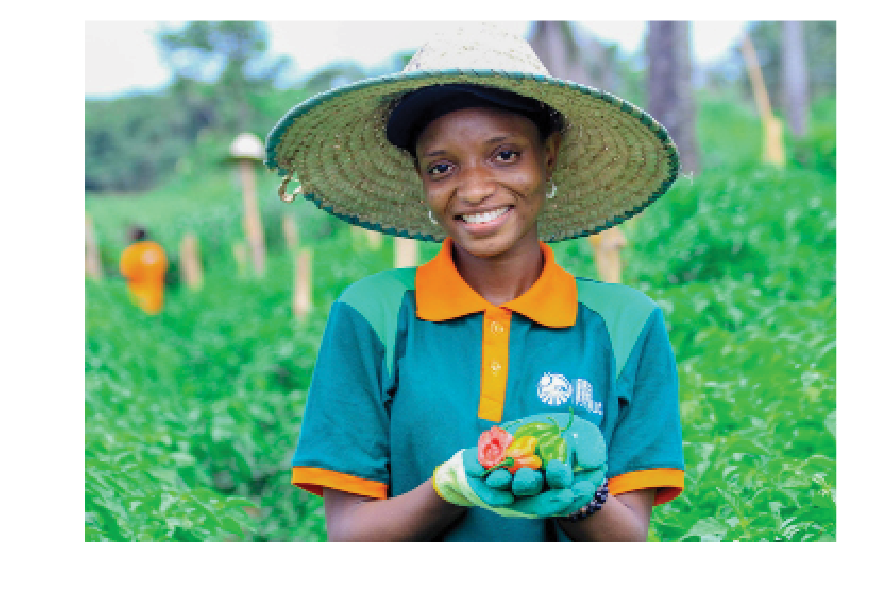Baliqees Salaudeen Ibrahim is the co-founder and CEO of Green Republic Farms. The farm leverages technology and innovation to cultivate high-quality produce like habaneros, bell peppers, and tomatoes on the outskirts of Ibadan. Beyond farming, Green Republic Farms is committed to improving the livelihoods of women, young people, and the broader community.
At Green Republic Farms, “we see agriculture as a means to contribute to the food and agricultural sector rather than compete. We understand the need for more people to join the sector to ensure a steady supply of healthy food for everyone,” she stressed.
Baliqees shared that their entry into the business was driven by a desire to adopt climate-friendly practices to boost productivity and move away from traditional farming methods, which are less resilient to climate shocks. This approach not only enhances productivity but also contributes to the livelihoods of people by creating job opportunities.
Currently, a significant percentage of our employees are from the local village where our farm is situated, with many being women. We employ as many as 65 to over 100 women, which has greatly enhanced our strategy for inclusion in our business.
Baliqees noted that the very act of starting the business is a success in itself. “Often, we have ideas and admire others’ work, but leaping to start requires courage. For us, one of the most important successes is that we started and are thriving in the business,” she said.
Another key success is exposing the local community to new farming methods. Whenever we introduce an innovation or new practice at the farm, we invite community members to learn and adopt these methods. This accessibility, beyond job creation and livelihood improvement, is a significant achievement.
Lucrativity
Agriculture is highly profitable. A large portion of the horticultural produce consumed in the southwest market comes from the northern part of Nigeria, with Lagos State, having over 28 million people, being the largest consumer. We have strategically located our farm close to major markets in the southwest. For instance, it’s about an hour’s drive from her farm to Mile 12 market without traffic. This proximity ensures that produce is fresh and quickly available after harvest.
Despite the perishable nature of produce, she said, “we have implemented measures to extend their shelf life. They can be stored in the fridge or kept fresh in the kitchen. This has positioned us well in the horticultural sector, especially in the southwest market where pepper is a daily staple. Additionally, we cater to foreigners in the market who prefer non-spicy produce like tomatoes and bell peppers.
Challenges
“One of our major challenges was the removal of the fuel subsidy, which increased our fuel costs significantly. We spent around N40,000 weekly on petrol to pump water for irrigation. To address this, we partnered with the HortiNigeria Project, an International Fertiliser Development Centre (IFDC) initiative supporting horticultural farmers in Oyo, Ogun, Kano, and Kaduna states. They provided us with a solar system for our borehole, allowing us to pump water without relying on costly fuel.”
Another challenge she mentioned was an extreme rainfall event that increased pest infestations, destroying a significant portion of our produce. To combat this, “we converted our nursery into our first soilless farming facility, which proved successful. We also raised funds to construct greenhouses, where we now cultivate bell peppers.
“We currently have four greenhouses, thanks to support from partners and grants.
Market prices often fluctuate, especially when there is a huge influx of produce from the northern part of Nigeria. To adapt, we set a baseline price at the beginning of the year to ensure affordability for both the open market and direct consumers,” she pointed out.
Advice
For those interested in agribusiness, Baliqees advised committing time to learn from industry veterans to avoid common mistakes as mentorship and guidance are crucial. Understanding the different value chains in agriculture—whether as a primary producer, processor, aggregator, or exporter—, she said, is also essential.
Continuous learning and seeking advice from experts are also important. Baliqees herself is graduating from the Lagos Business School Agric Management Programme, which has exposed her to various agricultural value chains. This knowledge continues to improve their work at the farm.
Biography
Baliqees Salaudeen Ibrahim is the co-founder and CEO of Green Republic Farms, a pioneering venture that leverages technology and innovation to cultivate high-quality agric produce .
Baliqees has a rich professional journey that spans climate advocacy, policy, community engagement, and gender issues. She began her career with community clean-ups, government engagement, climate policies, and stakeholder engagement, progressively building her expertise both locally and internationally. Her efforts have been recognised across Nigeria, Africa, and the world, showcasing her dedication and intentionality in the climate space.
A significant achievement in her career is Green Republic Farms, which stands as a testament to her commitment to sustainable agriculture and community empowerment. Baliqees was also among the 26 startups that received the Lagos agrinovation grants of N100 million, further solidifying her impact and contribution to the agricultural sector.
